
 The Taiwan website Storm Media has offered a rationale of sorts for Pope Francis’s “provisional agreement” with the Chinese government on the status of the Catholic Church in China: “Toward China, ‘A Daring Advance to the East,’ with a Deliberate Choice to Remain Silent: Is Pope Francis a ‘Cold Machiavellian’?” (December 23 2018). Continue reading Frank and Nick: Is the Provisional Agreement a Really Shrewd Move?
The Taiwan website Storm Media has offered a rationale of sorts for Pope Francis’s “provisional agreement” with the Chinese government on the status of the Catholic Church in China: “Toward China, ‘A Daring Advance to the East,’ with a Deliberate Choice to Remain Silent: Is Pope Francis a ‘Cold Machiavellian’?” (December 23 2018). Continue reading Frank and Nick: Is the Provisional Agreement a Really Shrewd Move?
Divination Song (卜算子)
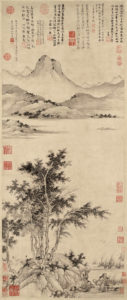
我住长江头,
君住长江尾。
日日思君不见君,
共饮长江水。
此水几时休?
此恨何时已?
只愿君心似我心,
定不负相思意
Li Zhiyi (ca 1048-1117
You live near the river’s source
And I where it has run its course
I see you only when I dream
And yet we drink from the same stream.
The water keeps on flowing,
My yearning keeps on growing.
I wish your heart were like my heart
And we’d no longer dwell apart.
(Sort of.) For a contemporary musical rendition by the late much lamented Theresa Deng (鄧麗君, 1953-1995), see here
Family Affairs

Various sources, including the Chinese section of the Voice of America, have been carrying speculation concerning the rising prominence of Peng Liyuan (彭麗媛), wife of State Chairman and Party General Secretary Xi Jinping, in the official Chinese media. Miss Peng is Xi’s second wife. When they married in the early 1990s she was a noted entertainer and singer, and continued her own career after marriage, often living apart from her husband. She has been appearing together with him at various state functions. The picture above shows the various foreign grandees attending an import exposition in Shanghai, with Chairman Xi and his wife front and center, no other Chinese leaders featured.
The Provisional Agreement, a Month or So Later
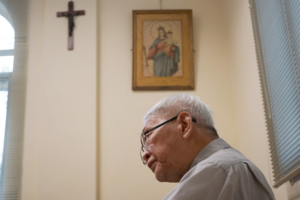
The New York Times has published an extended critique by Cardinal Joseph Zen Ze-Kiun (陳日君—Mandarin pronunciation: Chen Rijun), Bishop Emeritus of Hong Kong, of the September provisional agreement between the Vatican and Beijing, whereby the Vatican agrees to recognize those Chinese bishops appointed by the political authorities (via the Chinese Catholic Patriotic Association), and the political authorities in turn allow the Pope a veto over the appointment of future bishops. Zen asserts that the Pope has been fooled both by the Chinese authorities and by his own bureaucracy. The Pope is an Argentine and all of his life has seen communists as the oppressed. He does not understand that when they gain power they become the oppressors. The Pope desires that the official and underground communities in China come together again, but the consequence will be “the annihilation of the real church in China.” “If I were a cartoonist,” Zen says, “I would draw the Holy Father on his knees offering the keys of the kingdom of heaven to President Xi Jinping and saying, ‘Please recognize me as the pope.’”
Continue reading The Provisional Agreement, a Month or So Later
Han Feizi on How to Get Your Way
with the Boss, Your Spouse, Your Lover, Anyone in a Position to Help You or Harm You
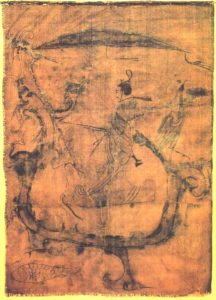
夫龍之為虫也,柔可狎而騎也;然其喉下有逆鱗徑尺。若人婴者,則必殺人。人主亦有逆鱗。説者能無婴人主之逆齡,則幾矣。
The dragon is a gentle beast. If you indulge him and humor him, you may ride on his back. But beneath his throat there are transverse scales a foot long, and if you touch those scales, he will kill you. The lord of men also has transverse scales. Someone who is able to avoid touching the ruler’s transverse scales is well on the way to mastering the art of persuasion.
This is a passage from the Han Feizi, considered to be one of the early masterpieces of Chinese prose. The book named for its assumed author, Han Fei (c.279-233 BC), the major thinker in the “Legalist” tradition. The Legalists believed that the way to public order was through a strict set of laws rigorously and impartially enforced. They assumed human beings were inherently self-seeking: each one of us is out for one’s self. The way to stable order is to assure that good behavior, as set forth in the laws, is rewarded, and that violations of the laws punished. Good behavior will then accord with self-interest. There is much in Han Fei’s thinking that is consistent with contemporary rational choice theory.
穆磐石

世間行樂亦如此
古來萬事東流水
Peter R. Moody is professor emeritus of political science at the University of Notre Dame. He has taught about and written on Chinese politics, Chinese political thought, East Asian political systems, and international relations in East Asia.
Li Shangyin, “Going Up to the Pleasure Garden”(李商隱 登樂遊原)

向晚意不適 驅車登古原
夕陽無限好 只是近黃昏
Toward evening I felt uneasy
And rode up into the hills.
The sunset was indescribably beautiful
But night was falling fast.
Vatican’s Deal with Communists Risks Undermining Chinese Catholics
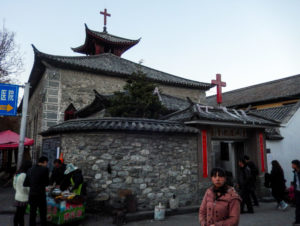
On September 22, the Holy See announced it had reached a “provisional agreement” with the Chinese government on the appointment of bishops. This deal may undermine Chinese Catholics, many of whom may secularize or go Pentecostal. Or the deal may subtly undermine the Communist Party’s authority by recognizing some papal authority.
Liu Zongyuan, “Snow on the River” (栁宗元 , 江雪)
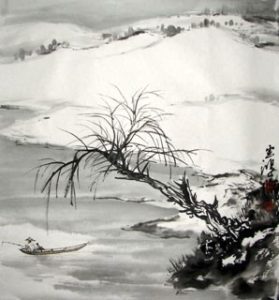
孤舟蓑笠翁,独钓寒江雪。
There are no birds flying in the mountains,
No trace of footprints on the paths.
A single boat, a lonely farmer
Is fishing in the snowy winter.
